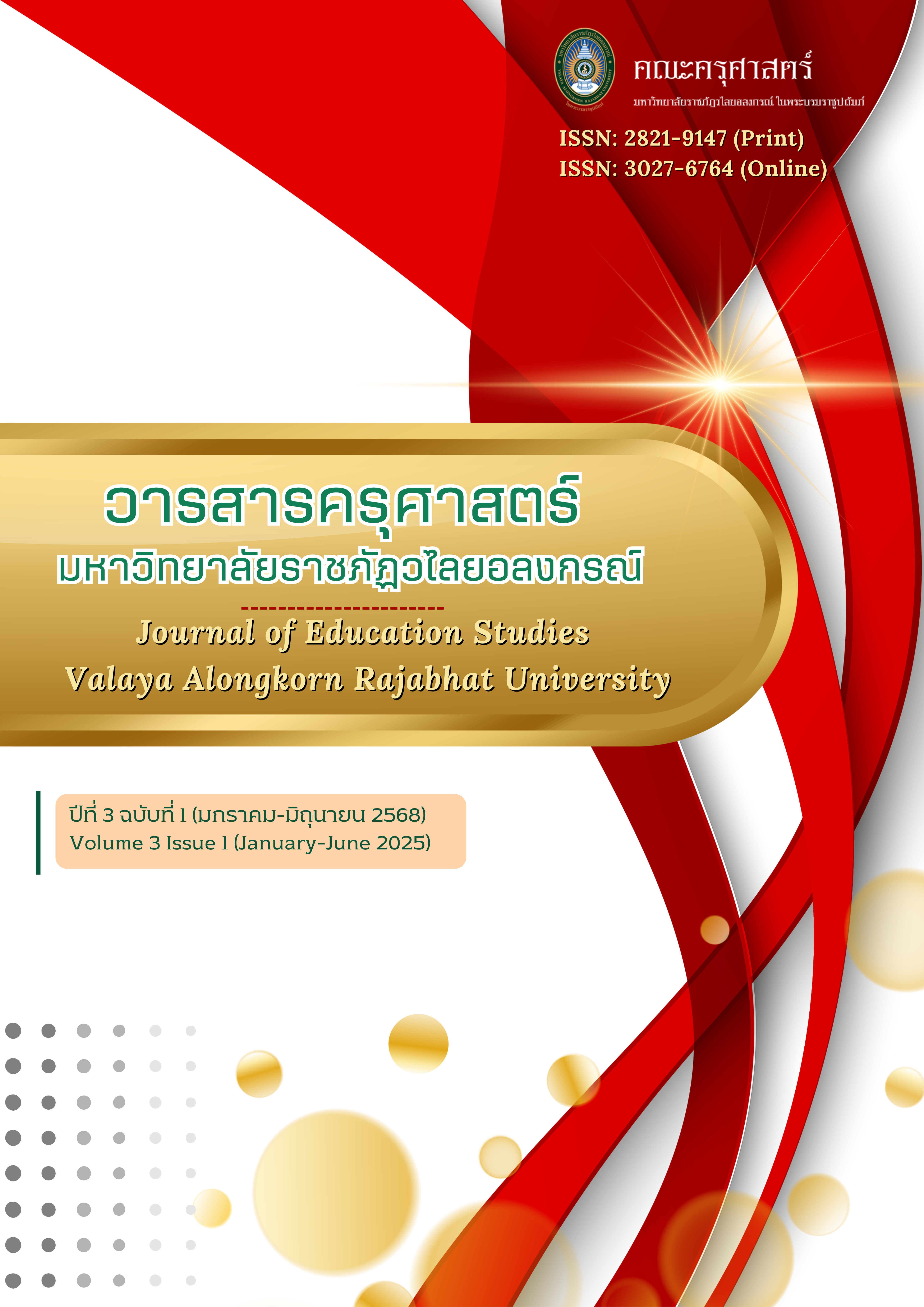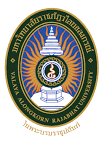ผลการใช้การจัดการเรียนรู้แบบสืบเสาะหาความรู้ 5 ขั้นตอน ร่วมกับชุดกิจกรรมการเรียนรู้วิทยาศาสตร์ เรื่อง วงจรไฟฟ้า ที่มีต่อทักษะการทดลอง และพัฒนาการด้านความรู้ในการทดลองของนักเรียนชั้นมัธยมศึกษาปีที่ 3
คำสำคัญ:
ชุดกิจกรรมการเรียนรู้วิทยาศาสตร์, การเรียนรู้แบบสืบเสาะหาความรู้ 5 ขั้นตอน, ทักษะการทดลอง, ความรู้ในการทดลอง, วงจรไฟฟ้าบทคัดย่อ
งานวิจัยนี้จึงมีวัตถุประสงค์เพื่อ (1) เปรียบเทียบทักษะการทดลองของนักเรียนชั้นมัธยมศึกษาปีที่ 3 หลังจัดการเรียนรู้แบบสืบเสาะหาความรู้ 5 ขั้นตอน ร่วมกับชุดกิจกรรมการเรียนรู้วิทยาศาสตร์ เรื่อง วงจร ไฟฟ้าเทียบกับเกณฑ์ร้อยละ 70 และ (2) ประเมินพัฒนาการด้านความรู้ในการทดลองของนักเรียนชั้นมัธยมศึกษาปีที่ 3 หลังเรียนด้วยการจัดการเรียนรู้แบบสืบเสาะหาความรู้ 5 ขั้นตอนร่วมกับชุดกิจกรรมฯ กลุ่มตัวอย่างเป็นนักเรียนมัธยมศึกษาปีที่ 3 จำนวน 42 คน ที่ได้มาโดยการสุ่มแบบกลุ่ม เครื่องมือที่ใช้ในการวิจัย ประกอบด้วย (1) แผนการจัดการเรียนรู้และชุดกิจกรรมเรื่องวงจรไฟฟ้า จำนวน 3 แผน (2) แบบประเมิน ทักษะการทดลองซึ่งมีลักษณะเป็นแบบตรวจสอบรายการ และ (3) แบบวัดความรู้ในการทดลองเป็นข้อสอบอัตนัยแบบตอบสั้น วิเคราะห์ข้อมูลด้วยค่าเฉลี่ยเลขคณิต ส่วนเบี่ยงเบนมาตรฐาน และคะแนนพัฒนาการสัมพัทธ์ ผลการวิจัยพบว่า (1) ทักษะการทดลองของนักเรียนชั้นมัธยมศึกษาปีที่ 3 หลังเรียน มีคะแนนเฉลี่ยเท่ากับ 86.385.26 คะแนน คิดเป็นร้อยละ 79.98 ซึ่งสูงกว่าเกณฑ์ร้อยละ 70 ที่กำหนดไว้ (2) คะแนนพัฒนาการสัมพัทธ์ด้านความรู้ในการทดลอง มีค่าเฉลี่ยร้อยละของคะแนนในภาพรวมเท่ากับ 62.31 อยู่ในเกณฑ์พัฒนาการระดับสูง และเมื่อพิจารณาเป็นรายบุคคล พบว่านักเรียนส่วนใหญ่ (จำนวน 37 คน คิดเป็นร้อยละ 88.10) มีคะแนนพัฒนาการด้านความรู้ในการทดลองอยู่ในเกณฑ์พัฒนาการระดับสูงเช่นเดียวกัน
เอกสารอ้างอิง
กระทรวงศึกษาธิการ. (2560). ตัวชี้วัดและหลักสูตรแกนกลาง กลุ่มสาระการเรียนรู้วิทยาศาสตร์ (ฉบับปรับปรุง พ.ศ. 2560) ตามหลักสูตรแกนกลางการศึกษาขั้นพื้นฐาน พุทธศักราช 2551. สำนักคณะกรรมการการศึกษาขั้นพื้นฐานกระทรวงศึกษาธิการ. กรุงเทพฯ: โรงพิมพ์ชุมชนสหกรณ์การเกษตรแห่งประเทศไทย จำกัด.
กฤษณะ ประฉิมมะ และเอื้อมพร หลินเจริญ. (2567). การพัฒนาชุดกิจกรรมการเรียนรู้วิทยาศาสตร์โดยใช้ปัญหาเป็นฐานเพื่อส่งเสริมผลสัมฤทธิ์ทางการเรียน เรื่อง ปริมาณทางไฟฟ้าสำหรับนักเรียนชั้นมัธยมศึกษาปีที่ 3. Journal of Modern Learning Development, 9(2), 57-72.
เจิดจิรัฐิต์ โสรัตยาทร และจักรกฤษณ์ จันทะคุณ. (2565). การพัฒนากิจกรรมการเรียนรู้แบบสืบสอบด้วยการใช้ห้องทดลองเสมือนเพื่อส่งเสริมมโนทัศน์ทางวิทยาศาสตร์ภายใต้สถานการณ์การแพร่ระบาดของโควิด-19 สำหรับนักเรียนชั้นประถมศึกษาปีที่ 6. วารสารวิจัยมหาวิทยาลัยเวสเทิร์น มนุษยศาสตร์และสังคมศาสตร์, 8(3), 15-28.
ทิศนา แขมมณี. (2562). ศาสตร์การสอน: องค์ความรู้เพื่อการจัดกระบวนการเรียนรู้ที่มีประสิทธิภาพ (พิมพ์ครั้งที่ 23). กรุงเทพฯ: สำนักพิมพ์จุฬาลงกรณ์มหาวิทยาลัย.
ธัญญเรศ ก้อนจันทร์เทศ และ สิรินภา กิจเกื้อกูล. (2566). การจัดการเรียนรู้แบบสะตีมศึกษาเพื่อส่งเสริมทักษะความคิดสร้างสรรค์และเจตคติต่อวิทยาศาสตร์ เรื่อง สารอาหาร ของนักเรียนชั้นประถม ศึกษาปีที่ 6. Journal of Roi Kaensarn Academi, 8(10), 50-69.
บังอร เสรีรัตน์ นาฎฤดี จิตรรังสรรค์ สมบัติ คชสิทธิ์ ประพรรธน์ พละชีวะ ธัญวรัตน์ ปิ่นทอง วิภาวดี แขวงเมฆ และรุ่งอรุณ วณิชธนะชากร. (2567). การศึกษาการจัดการเรียนรู้ฐานสมรรถนะของสถานศึกษาระดับการศึกษาขั้นพื้นฐาน. วารสารวไลยอลงกรณ์ปริทัศน์, 14(3), 209-219.
พัชรินทร์ วัฒนราช. (2563). การพัฒนาชุดกิจกรรมการเรียนรู้ตามกระบวนการสืบเสาะหาความรู้ (5E) เรื่อง พลังงานไฟฟ้า วิชาวิทยาศาสตร์ สำหรับชั้นมัธยมศึกษาปีที่ 3. วารสารวิชาการมหาวิทยาลัยราชภัฏภูเก็ต, 16(2), 43-57.
ศิริชัย กาญจนวาสี. (2552). ทฤษฎีการประเมิน. กรุงเทพฯ: สำนักพิมพ์แห่งจุฬาลงกรณ์มหาวิทยาลัยสถาบันส่งเสริมการสอนวิทยาศาสตร์และเทคโนโลยี
กระทรวงศึกษาธิการ. (2561). คู่มือการใช้หลักสูตรรายวิชาพื้นฐานวิทยาศาสตร์ กลุ่มสาระการเรียนรู้วิทยาศาสตร์ (ฉบับปรับปรุง พ.ศ.2560) ตามหลักสูตรแกนกลางการศึกษาขั้นพื้นฐาน พุทธศักราช 2551 ระดับมัธยมศึกษาตอนต้น. สืบค้นจาก https://www.scimath.org/ebook-science/item/8923-2018-10-01-01-59-16
สถาบันส่งเสริมการสอนวิทยาศาสตร์และเทคโนโลยี กระทรวงศึกษาธิการ. (2566). การแถลงข่าวผลการประเมิน PISA 2022. สืบค้นจาก https://pisathailand.ipst.ac.th/news-21/
สำนักงานเลขาธิการสภาการศึกษา. (2564). การเรียนรู้ฐานสมรรถนะเชิงรุก: ถอดบทเรียนการปฏิบัติของโรงเรียนทุ่งมหาเมฆ กรุงเทพมหานคร. สืบค้นจาก https://www.onec.go.th/th.php/book/BookView/1898
ฮัฟซะห์ สะดียามู, มูนีเร๊าะ ผดุง และรูฮัยซา ดือราแม. (2567). การพัฒนาชุดกิจกรรมการเรียนรู้โดยใช้วิธีการสอนแบบสืบเสาะหาความรู้ 7 ขั้น ร่วมกับห้องปฏิบัติการเสมือนจริง เรื่อง แรงไฟฟ้าและพลังงานไฟฟ้า เพื่อส่งเสริมทักษะกระบวนการทางวิทยาศาสตร์ ของนักเรียนชั้นประถมศึกษาปีที่ 6. วารสารราชภัฏยะลา,19(3), 71-80.
Abrahams, I. & Millar, R. (2007). Does Practical Work Really Work? A study of the effectiveness of practical work as a teaching and learning method in school science. International Journal of Science Education, 30(14), 1945-1969. Retrieved from https://doi.org/10.1080/09500690701749305
Boesdorfer S. B. & Livermore R. A. (2018). Secondary school chemistry teacher’s current use of laboratory activities and the impact of expense on their laboratory choices, Chemistry Education Research and Practice, 19(1), 135-148. Retrieved from https://doi.org/10.1039/C7RP00159B
Bybee, R., Taylor, J. A., Gardner, A., van Scotter, P., Carlson, J., Westbrook, A. &Landes, N. (2006). The BSCS 5E instructional model: Origins and effectiveness. Colorado Springs, CO: BSCS.
Cajayon, J. B. & Benavides, N. G. (2022). Development and Validation of Inquiry-Based Learning Activity Sheets in Life Science. United International. Journal for Research & Technology, 3(5), 69-82.
Cheung D. (2007). Facilitating chemistry teachers to implement inquiry-based laboratory work. International Journal of Science and Mathematics Education, 6(1), 107-130.
Fitz-Gibbon, C.T., Lyons M. & Lynn J. (1987). How to design a program evaluation. Newbury Park: Sagh.
Goodhew, L. M., Robertson, A. D., Heron, P. R. L., and Scherr, R. E. (2019). Student conceptual resources for understanding mechanical wave propagation. Physical Review Physics Education Research. 15, 020127-1- 020127-16. Retrieved from https://doi.org/10.1103/PhysRevPhysEducRes.15.020127
Haerani, H., Arsyad, M., & Khaeruddin, K. (2023). Development of Experiment-Based Physics Worksheets in Science in Developing Students’ Science Process Skills. Jurnal Penelitian Pendidikan IPA, 9(1), 292-298. Retrieved from https://doi.org/10.29303/jppipa.v9i1.2609
Korganci, N., Mirona, C., Dafineia, A., & Antohea, S. (2015). The Importance of Inquiry Based Learning on Electric Circuit Models for Conceptual Understanding. Procedia -Social and Behavioral Sciences, 191, 2463-2468. Retrieved from https:/doi.org/10.1016/j.sbspro.2015.04.530
Mashood, K. K., & Singh, V. A. (2013). Large-scale studies on the transferability of general problem-solving skills and the pedagogic potential of physics.” Physics Education, 48, 629-635.
Mason, A., & Singh, C. (2016). Using categorization of problems as an instructional tool to help introductory students learn physics. Physics Education, 51, 025009 (5pp).
Nitko, A.J. & Brootkhart, S. M. (2015). Educational Assessment of Students. (7th Edition). Pearson Education, Inc., Upper Saddle River.
Oladehinde, A. A. (2001). Resource Utilization in Classroom. The Effect of Learning Activity Package to Teach Biology at the Senior Secondary School Level. Journal of Science Teachers Association of Nigeria (JSTAN), 40(2), 103-106.
Orosz, G., Németh, V., Kovács, L. Somogyi, Z. & Korom, E. (2023). Guided inquiry-based learning in secondary-school chemistry classes: a case study. Chem. Educ. Res. Pract., 24, 50-70. Retrieved from https:/doi.org/10.1039/D2RP00110A
Pejuan, A., Bohigas, X., Jaen, X., & Periago, C. (2012). Misconceptions about Sound among Engineering Students. Journal of Science Education and Technology, 21(6), 669-685. Retrieved from https:/doi.org/ 10.1007/s10956-011-9356-6
Romero-Ariza M., Quesada A., Abril A., Sorensen P., & Oliver M. (2020). Highly recommended and poorly used: English and Spanish Science Teachers’ views of inquiry-based learning (IBL) and its enactment, EURASIA Journal of Mathematics, Science and Technology Education, 16(1), 1-16. Retrieved from https://doi.org/10.29333/ejmste/109658
Silm G., Tiitsaar K., Pedaste M., Zacharia Z. C. & Papaevripidou, M. (2017). Teachers’ readiness to use inquiry-based learning: An investigation of teachers’ sense of efficacy and attitudes toward inquiry-based learning, Science Education International, 28(4), 315-325.
Smithenry D. W. (2010). Integrating guided inquiry into a traditional chemistry curricular framework, International Journal of Science Education, 32(13), 1689-1714. Retrieved from https://doi.org/10.1080/09500690903150617
Whitney, D. R., & Sabers, D. L. (1970). Improving essay examination III: Use of item analysis, Technical Bulletin 11. Mimeographed. (Iowa City: University)









